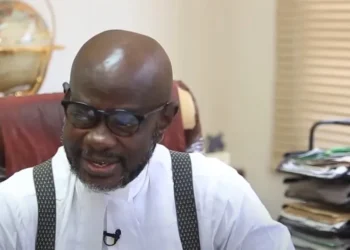In a comprehensive press briefing, the Health Minister Dr. Okoe Boye, has given a detailed significant stride in Ghana’s health sector, emphasizing the synchronization of 31 agencies under the Ministry of Health. The coordinated effort, Hon. Okoe Boye explained is crucial in delivering high-quality health services to the people of Ghana.
The briefing aimed to highlight major policies, strategies, and financial protection efforts implemented by the Ministry to ensure accessible and affordable healthcare for all Ghanaians. The National Health Policy and the Health Sector Medium-Term Development Plan (2022-2025) were outlined as the cornerstones of the Ministry’s efforts toward universal health coverage. According to the Minister, these policy documents “provide the broad direction for the health sector,” serving as Ghana’s roadmap for attaining universal health coverage.
“We have a vision of a health sector that creates a healthy population for national development and the mission is to contribute to socio-economic development as well as improving on the quality of life for all Ghanaians.”
Dr Okoe Boye the Health Minister of Ghana
According to Hon. Okoe Boye, the three policies document Ghana’s efforts and interventions to ensure that the health sector is resilient and responsive to emerging crises, like the pandemics and the MPOX which we have currently.
Hon. Okoe Boye noted that the health policy also encourages the adoption of healthy lifestyles and preventive medicine, highlighting the shift from curative approaches to preventive measures. He noted; “We are used to focusing on curing diseases instead of preventing them.”
Hon. Okoe Boye lamented, emphasizing that a healthier population can be achieved through the promotion of healthier lifestyles and an improved physical environment. Hon. Okoe Boye acknowledged that individual behavior is often influenced by the environment, which makes this a priority of national policy.
Improving Access to Healthcare
Hon.Okoe Boye also underscored the importance of improving physical access to healthcare infrastructure. He said, “We have universal access to better and efficiently managed quality healthcare, and we are minimizing avoidable maternal, adolescent, and child mortality.” Additionally, the Hon. Okoe Boye highlighted the significant focus on clinical and public health emergencies, mentioning the efforts being made to increase access to responsive healthcare during emergencies like the recent MPOX outbreak. The strategic objective is to improve access to quality healthcare for all Ghanaians, particularly during times of public health crises.
”We have the 2022, 2025 health sector medium-term development plan with the following objectives to ensure sustainable, affordable, equitable, easily accessible health care, reduce morbidity and mortality, and intensify prevention and control of noncommunicable disease, and here, I think the 3 main ones, are hypertension and diabetes, cancers both adult cancers and childhood cancers and, organ diseases like kidney disease and liver disease.”
Dr Okoe Boye the Health Minister of Ghana
According to Dr. Okoe Boye the ministry is focusing on reducing the morbidity and mortality from noncommunicable diseases, with specific attention on adult and childhood cancers, as well as organ diseases like kidney and liver disease.
Moreover, Hon. Okoe Boye discussed the new national infection prevention and control strategy, aimed at preventing hospital-acquired infections and controlling antimicrobial resistance (AMR). He pointed out that one of the major threats to healthcare today is antimicrobial resistance. He noted; “One of the biggest threats now to healthcare is the situation where you give antibiotics, and they don’t work because they’ve been abused. It’s a big issue.” Hon. Okoe Boye stressed the importance of financial protection for citizens accessing healthcare, particularly through the National Health Insurance Scheme (NHIS).
“… The strength of the national health insurance scheme and how it helps Ghanaians access healthcare without the ability to pay being a hindrance.”
Dr Okoe Boye the Health Minister of Ghana
Hon. Okoe Boye elaborated on the need for a solid financing strategy to ensure the sustainability of the NHIS and other health initiatives. Hon. Okoe Boye acknowledged that Ghana would need to transition toward fully funding certain medicines, including HIV and malaria drugs, by 2032.
According to Hon. Okoe Boye the COVID-19 Test-to-Treat strategy was another initiative highlighted by the Minister. He pointed out; “This strategy is there to make sure we continue to monitor our borders.”
Hon. Okoe Boye also made a significant announcement regarding the integration of herbal medicine into the public healthcare system. He emphasized that the government is working to include herbal medicines on the NHIS list of covered treatments.
“We have well-trained herbal practitioners in our hospitals who dispense medicines that have been tested in our labs and are safe for consumption.”
Dr Okoe Boye the Health Minister of Ghana
Additionally, Hon. Okoe Boye highlighted the success of the National E-health Project, which has connected most hospitals in Ghana to a digital health system. This system, operational since 2017, has drastically improved the efficiency of healthcare delivery by enabling the storage of patient records electronically.
“ [Previously] you had to wait hours to access your folder at government hospitals…in now Kolebu Teaching Hospital, no one takes your history with a pen and paper anymore, all your data is on a computer and by the time you get to the lab, the lab [technician] has your data on the computer, by the time you [reach] the theater, your information is on the computer.”
Dr Okoe Boye the Health Minister of Ghana
This initiative, he said, has significantly improved patient care and reduced waiting times in hospitals.
Hon. Okoe Boye stressed the importance of continuing these initiatives to ensure sustainable healthcare delivery for all Ghanaians. With a focus on universal access, financial protection, and the integration of new technologies, the health sector is well-positioned to contribute to the overall social and economic development of the country. He reiterated; “We are committed to ensuring that all Ghanaians have access to quality healthcare, regardless of their financial situation.” This comprehensive briefing not only laid out the Ministry’s plans for the future but also reinforced the commitment to building a resilient and inclusive healthcare system in Ghana.
READ ALSO; US Election: Pharrell Williams Slams Celebrities Making Public Political Endorsements







